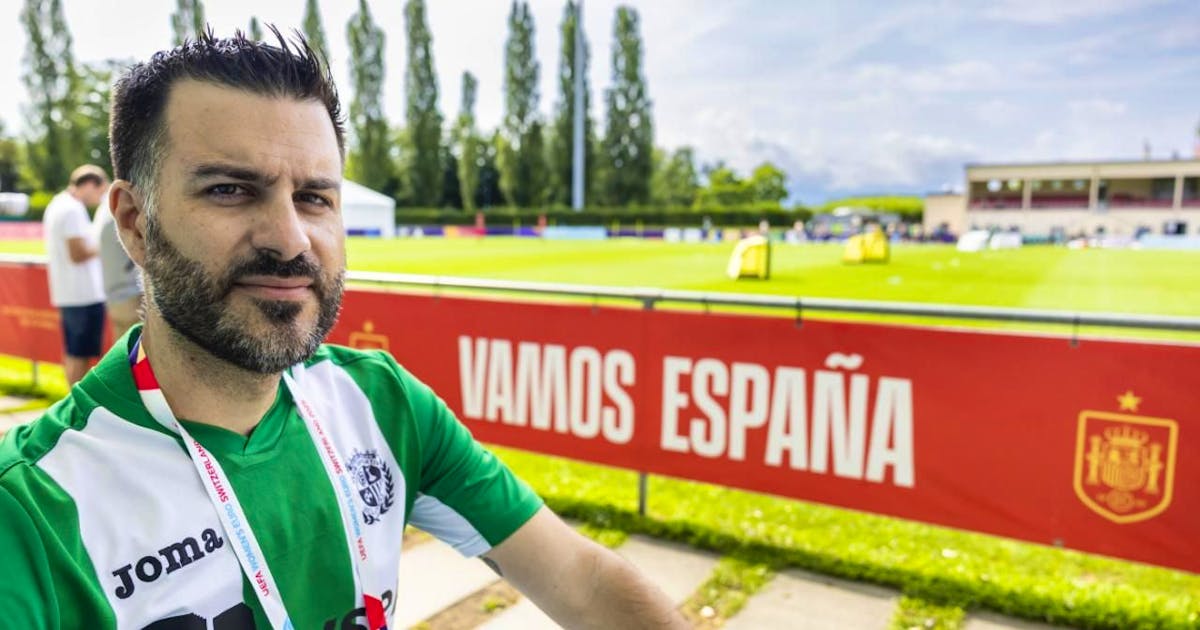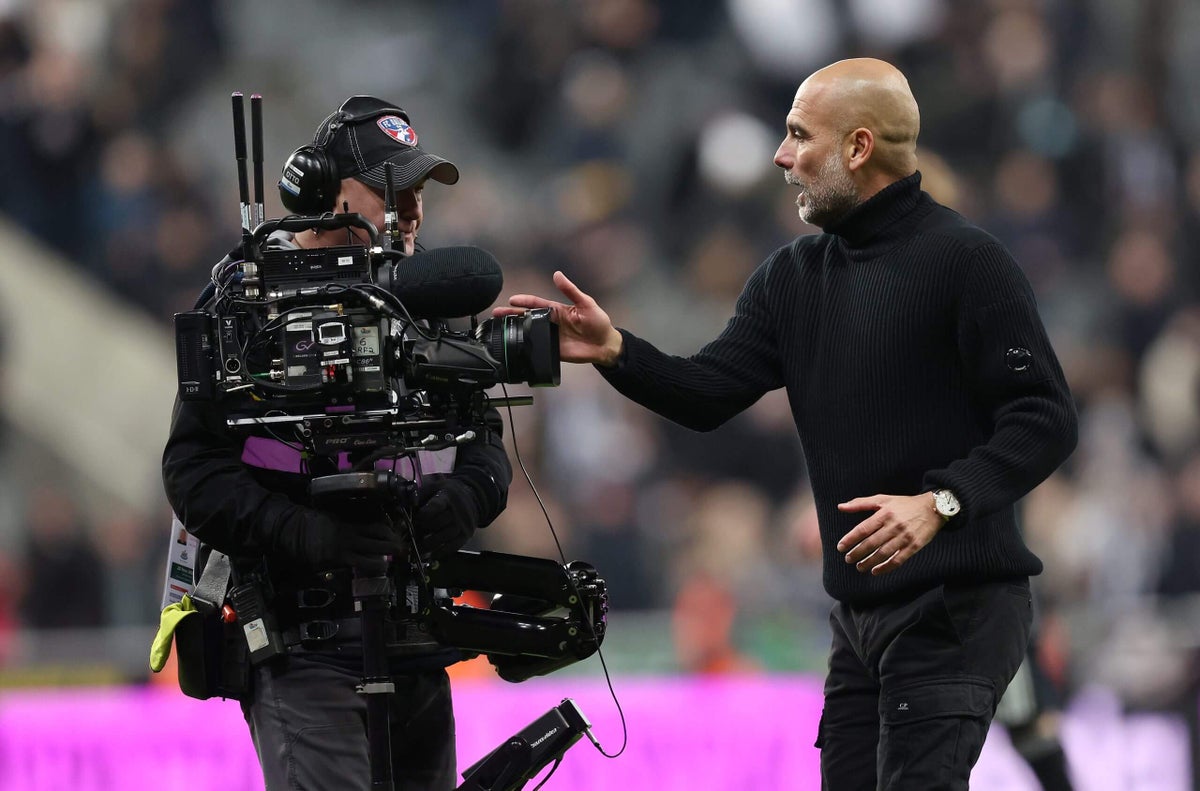Keystone
David Menayo Ramos knows Spanish women’s football like no other. The 43-year-old journalist from the sports newspaper Marca believes in an easy victory against Switzerland.
La Buvette at Stade Lausanne-Ouchy is a hive of activity on Tuesday lunchtime. During the European Championships, the Juan Antonio Samaranch Stadium on the shores of Lac Léman is the headquarters of the world champions from Spain. Day after day, the media professionals reporting on “La Roja” gather in the buvette, which has been converted into a workroom, where two large air conditioning units blow in cool air and share with the “aficionados” at home what the “Selección” are up to.
In a glass display case are a few packets of potato chips, a handful of apples and bananas, and sweets are packed in small plastic bags. On a slate board behind the counter you can read that sandwiches, hot dogs and croque monsieur are sometimes also available here.
It has the charm of a club that plays somewhere in the lower echelons of regional football. With large pictures of the players, the Royal Spanish Football Association tries to bring at least some World Cup flair to the wood-paneled room. The words “Jugar, Luchar, Ganar” – play, fight, win – are written in large white letters on a purple wall.
It is the motto of these Spanish women who want to ascend Europe’s football throne for the first time. The belief that they will succeed in Switzerland is also strong among the media representatives. One of them is David Menayo Ramos.
No Spanish journalist has followed the Spanish women’s national team for as long as he has. During his studies, Menayo Ramos, who grew up in Bilbao, noticed that there was nothing to read in the media about his footballing colleague. This motivated him to do something about it. Today, nobody in Spain knows as much about women’s football as he does.
The 43-year-old has been working for the renowned Spanish sports newspaper Marca since 2007. At his first European Championship in Sweden in 2013, he was the only media representative from Spain to accompany the team at the tournament. Today he is one of around 40.
In an interview with the Keystone-SDA news agency, Menayo Ramos talks about how Spain has become one of the best teams in the world, says where there is room for improvement even in his home country – and reveals what the Spaniards need to watch out for in the quarter-final against Switzerland.
David Menayo Ramos, will Spain be European women’s champions for the first time at the end of July?
After winning the world title in 2023, anything is possible. Spain won that title back then without the best players, without playing at their best. It’s different now. Now these factors are right. That’s why I think the Spanish are the favorites to win the title. But it’s important to be humble and respectful. There are very strong teams in the knockout phase.
Which teams do you see as the biggest threat to Spain?
The French have a lot of potential. They’re similar to Spain for a long time: they always have a good team but never manage to win a tournament. But they’ll get there one day. And it’s quite possible that they will this time.
And what else?
Germany are not going through their strongest phase at the moment. But they have a great fighting spirit. Spain would meet one of these two teams in the semi-final. For me, it would be an early final.
If Spain wins against Switzerland on Friday.
Switzerland deserve to be in the quarter-finals, but I think Spain are clearly the stronger team. In any case, it would be a huge surprise if Spain didn’t win.
In 2015, both Spain and Switzerland made their first appearance at a World Cup in Canada. Spain is now one of the world’s top teams, Switzerland is not. What has Spain done better in the last ten years?
The pool of good players in Spain is much larger than in Switzerland, and the championship in Spain is much stronger. The best Swiss players leave their own league, the best Spanish players almost all stay in Spain. And I think that football has a higher social status. In Switzerland, there are still all the winter sports like skiing, which are very popular.
Unlike Switzerland, Spain didn’t make it past the group stage at the 2015 World Cup. The players revolted, demanded better support from the association and brought about the dismissal of long-serving coach Ignacio Quereda. Was this revolution a decisive turning point in the development of women’s football in Spain?
Yes, it was the moment when the players decided to make public the conditions under which they had to play football, how little support they received from the association, that they were only allowed to travel to the tournament in Canada at very short notice, for example – and that it was impossible to make any progress.
And then?
There was a change. An energy supplier joined the league as a sponsor in 2015, which meant that all clubs suddenly had money to invest in players and infrastructure. Money always helps, of course, but even when the sponsor left, the clubs continued to invest. And the better conditions also led to better results. Suddenly it was no longer luck that Spain qualified for a tournament, but logic. Because the players have always had the footballing quality. Even in 1997, when the team surprisingly reached the semi-finals of the European Championship. At that time, however, only one player was a professional.
The players not only fought back in 2015, but also in 2022, when many no longer wanted to play under the authoritarian coach Jorge Vilda and therefore stayed away from the national team. Is this revolutionary part of the “Selección”?
There is always a point at which you stop evolving if you don’t fight back. If you settle for the status quo, you stagnate. The Selección players always want to improve and place high demands on themselves, but also on those around them. They want the best of the best because they themselves are the best of the best. We have two Ballon d’Or winners, we have players from FC Barcelona, the club that has dominated Europe in recent years. When things don’t go well, the players have to protest. Like the whole thing with the kissing of Luis Rubiales, the president of the association, after the World Cup title. Scandals like that destroyed the association to a certain extent, but now it has been rebuilt on new foundations.
Are there also things that still need to improve, even in Spain?
In the Primera División, there are still stadiums where games are played on artificial turf when they should be played on natural grass. And the fans should go to the stadium more. FC Barcelona may be the big flagship, but smaller clubs always make cuts in the women’s football department first – even if there is actually enough money available. Of course, Spain is ahead of other countries, otherwise it wouldn’t be achieving these results internationally. But I think there is still a lot to improve – especially at league level.
You mentioned the two world footballers Alexia Putellas and Aitana Bonmati. Will Spain always have such exceptional players in its ranks?
Fortunately, we can look forward to a few more years with Alexia and Aitana. And it’s true that they are often the center of attention, but there are other great players in this team. Mariona Caldentey, Patricia Guijarro or the young Laia Aleixandri and Vicky Lopez, who are among the best of their generation in their positions. Spain not only has a generation of good players, but is building a team that can be good for the next ten years and beyond.
So will Spain win everything in the next few years?
I don’t know, but Spain will certainly play for titles. The other nations are also doing well. You can’t ignore that. But Spain is already at a completely different point. When I was at my first European Championship in 2013, all the teams wanted to play Spain because it was easy to win. Today, nobody wants to play Spain anymore. The Spanish used to go to a tournament and know that they would probably be going home soon. Today, they believe they can win the title. This mentality has changed. Among the players, the staff, the fans and the media.
Speaking of the media. The Spanish press is rather critical of the national team.
There are always things that can be improved and there will always be things that can be criticized. No team is perfect. Now the Spanish defense is being criticized, but it has conceded the second-fewest goals. Of course there are weak points, every team has them, and if Spain want to win the tournament, they have to work on them. But in terms of perception, there are often only two extremes. Either applaud or criticize.
It’s clear that there will be a lot of criticism if Spain are eliminated by Switzerland on Friday. Coach Montse Tomé explicitly praised Swiss coach Pia Sundhage after the last group game and warned against the Swiss playing system with a defensive five-man back line.
Pia is a very experienced coach who has won a lot in her career. Switzerland benefits from that. But Pia can’t move mountains. She has the players she has at her disposal, and Spain have more quality. Switzerland have more bite now than they did in the Nations League. So I don’t think there will be a 7:1 as there was back in October 2023, but Spain will still prevail without any major problems.
Spain have already had problems with five-man chains.
Spain will try to keep the ball in the Swiss half and keep playing inside and out until a goal is scored. Spain play like this and can’t do anything else. Switzerland will probably play on the counterattack. Spain will have to be careful not to leave too many spaces open at the back.
Sydney Schertenleib would be someone who could exploit such spaces.
I really like Sydney. She has a lot of potential. Of course she still has to develop, but at Barcelona she’s surrounded by the best players. And she’s already one of the most important players in the national team. I think she’ll be a super strong player in a few years’ time.


